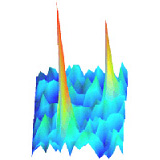Coppola S, Carnevale I, Danen EHJ, Peters GJ, Schmidt T, Assaraf YG, Giovannetti E (2017) A mechanopharmacology approach to overcome chemoresistance in pancreatic cancer., Drug Resist. Updat., 31, 43-51.
[DOI] [pdf]
Pancreatic ductal adenocarcinoma (PDAC) is a highly chemoresistant malignancy. This chemoresistant phenotype has been historically associated with genetic factors. Major biomedical research efforts were concentrated that resulted in the identification of subtypes characterized by specific genetic lesions and gene expression signatures that suggest important biological differences. However, to date, these distinct differences could not be exploited for therapeutic interventions. Apart from these genetic factors, desmoplasia and tumor microenvironment have been recognized as key contributors to PDAC chemoresistance. However, while several strategies targeting tumor-stroma have been explored including drugs against members of the Hedgehog family, they failed to meet the expectations in the clinical setting. These unsatisfactory clinical results suggest that, an important link between genetics and the influence of tumor microenvironment on PDAC chemoresistance remains to be elucidated. In this respect, mechanobiology is an emerging multidisciplinary field that encompasses cell and developmental biology as well as biophysics and bioengineering. Herein we provide a comprehensive overview of the key players in pancreatic cancer chemoresistance from the perspective of mechanobiology, and discuss novel experimental avenues such as elastic micropillar arrays that could provide fresh insights for the development of mechanobiology-targeted therapeutic approaches (know as mechanopharmacology) to overcome anticancer drug resistance in pancreatic cancer.

